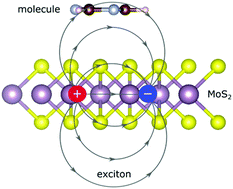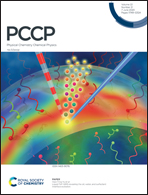Tuning the binding energy of excitons in the MoS2 monolayer by molecular functionalization and defective engineering†
Abstract
First-principle calculations within many-body perturbation theory are carried out to investigate the influence of the adsorbed molecules and sulfur (S) defects on the electronic and optical properties of the MoS2 monolayer. The exciton binding energy in the range of 0.05 eV to 1.14 eV is observed as a function of molecular coverage, when NO and 1,3,5-triazin (C3H3N3) are adsorbed on the pristine surface. These results can be explained by the interaction between the exciton and the adsorbed molecule. Furthermore, the combined effect of molecular functionalization and defective doping is studied. Our results show that both the electronic and optical band gaps of the MoS2 monolayer strongly depend on the molecular species and the defective coverage, and can be tuned up to ∼2 eV. This work demonstrates the great potential of controlling the MoS2 monolayer's excitonic properties by molecular functionalization and defective engineering.



 Please wait while we load your content...
Please wait while we load your content...